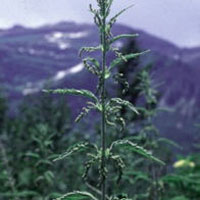Nettle
 © Steven Foster
© Steven FosterParts Used & Where Grown
Nettle is a leafy plant that is found in most temperate regions of the world. The Latin root of Urtica is uro, meaning “I burn,” indicative of the small stings caused by the little hairs on the leaves of this plant that burn when contact is made with the skin. The root and leaves of nettle are used in herbal medicine.
- Reliable and relatively consistent scientific data showing a substantial health benefit.
- Contradictory, insufficient, or preliminary studies suggesting a health benefit or minimal health benefit.
- For an herb, supported by traditional use but minimal or no scientific evidence. For a supplement, little scientific support.
Our proprietary “Star-Rating” system was developed to help you easily understand the amount of scientific support behind each supplement in relation to a specific health condition. While there is no way to predict whether a vitamin, mineral, or herb will successfully treat or prevent associated health conditions, our unique ratings tell you how well these supplements are understood by the medical community, and whether studies have found them to be effective for other people.
For over a decade, our team has combed through thousands of research articles published in reputable journals. To help you make educated decisions, and to better understand controversial or confusing supplements, our medical experts have digested the science into these three easy-to-follow ratings. We hope this provides you with a helpful resource to make informed decisions towards your health and well-being.
This supplement has been used in connection with the following health conditions:
| Used for | Amount | Why |
|---|---|---|
Benign Prostatic Hyperplasia | 120 mg of root extract (capsules or tablets) twice per day or 2 to 4 ml of tincture three times per day | A concentrated extract made from the roots of the nettle plant may increase urinary volume and flow rate in men with early-stage BPH. |
Osteoarthritis | Apply stinging nettle under the direction of a qualified healthcare practitioner | Stinging nettle has historically been used for joint pain and has been shown to be safe and effective for relieving the pain of osteoarthritis. |
Breast-Feeding Support | Refer to label instructions | as Stinging Nettle Topical Stinging nettle enriches and increases the flow of breast milk and restores the mother’s energy following childbirth. |
Hay Fever | 0.5 to 8 grams daily | Taking nettle leaf may ease symptoms, including sneezing and itchy eyes. |
Pregnancy and Postpartum Support | Refer to label instructions | Nettle leaf is rich in calcium and iron and is mildly diuretic. It enriches and increases the flow of breast milk and restores the mother’s energy following childbirth. |
Rheumatoid Arthritis | Refer to label instructions | Nettle has been used historically as a treatment for arthritis. It is applied topically, with the intent of causing stings to relieve arthritis pain. |
Urinary Tract Infection | Refer to label instructions | Nettle may relieve UTI symptoms by increasing urinary volume and helping to flush bacteria out of the urinary tract. |
Traditional Use (May Not Be Supported by Scientific Studies)
Nettle has a long history of use. The tough fibers from the stem have been used to make cloth and cooked nettle leaves were eaten as vegetables. From ancient Greece to the present, nettle has been documented for its traditional use in treating coughs, tuberculosis, and arthritis and in stimulating hair growth.
Copyright © 2025 TraceGains, Inc. All rights reserved.
Learn more about TraceGains, the company.
The information presented by TraceGains is for informational purposes only. It is based on scientific studies (human, animal, or in vitro), clinical experience, or traditional usage as cited in each article. The results reported may not necessarily occur in all individuals. Self-treatment is not recommended for life-threatening conditions that require medical treatment under a doctor's care. For many of the conditions discussed, treatment with prescription or over the counter medication is also available. Consult your doctor, practitioner, and/or pharmacist for any health problem and before using any supplements or before making any changes in prescribed medications. Information expires December 2025.
